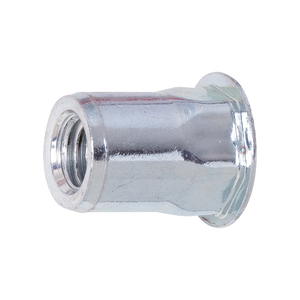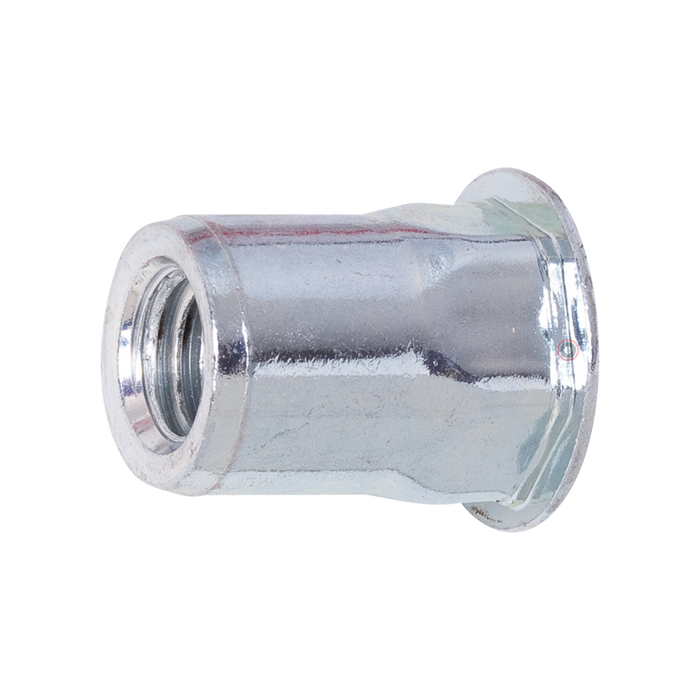Recommended Nutsert Installation Tools
Hex Nutsert - Steel - Half Hex Body
Brands you know and trust - Aerobolt
Hexagon shape steel nutserts - half hex body.
Hex nutserts provide all the benefits associated with Nutsert Xtralok only better with higher torque resistance to unscrewing and pulling out. Ideal in punched hex shape holes, here at Aerobolt we have the half hex half round option & the full hex option which we regard as a high strength version. Installation is easy via an air, cordless or manual nutsert tool. Often called hex inserts, hexserts, hex threaded inserts etc. they are ideal for applications where failure is not an option. Go to the blog for more hex nutsert information.
Hex Nutsert features.
- One side assembly for fast & easy installations.
- Highly resilient, forming a permanent superior thread.
- Fast & foolproof installation. Less time means lower cost.
- Easy to use nutsert tools & so much more.
Hexagon shape nutserts for maximum resistance to unscrewing.
Hexagon shaped nutserts that are designed for use in punched hex shape holes and provide exceptional resistance to spinning (i.e. can't be unscrewed). We have both half hex and full hex shape for extra strength.
Often called hex inserts, hexserts, hex threaded inserts etc. they are ideal for applications where failure is not an option.
Hex Nutsert Advantages
- Exceptional resistance to spinning, Hex Body
- Avoids stress fractures of parent material
- Superior thread strength
- Low profile head
- Extensive grip range
Hex Nutsert Applications
- Automotive
- Electrical engineering
- Sheet metal
- Domestic applications
- General light fabrication and more.
How Hex Nutserts works.
Hexserts - Hex shape rivet nuts when failure is not an option.
A Hex nutsert, also known as a rivet nut or threaded insert, is a type of fastener used to create a threaded hole in materials that are thin or where access to the backside is limited. It is commonly used when joining metal sheets or other materials that are too thin to support a tapped thread.
A hex nutsert consists of a hex shape body with a threaded interior and a flange at one end. The other end of the nut is open to allow access for installation.
To install a hex nutsert, a hole needs to cut or punched into the material. The hex nutsert is then inserted into the hole, and a tool is used to deform or compress the flange end. This process causes the nut to expand and grip the material securely. The threaded interior of the plus nut provides a reliable and durable anchor point for bolts, screws, or other fasteners.
Hex nutserts are commonly used in industries such as automotive, aerospace, electronics, and manufacturing, where they provide a versatile and efficient method for adding threaded connections to thin or inaccessible materials.
Hexagon shape nutserts for maximum resistance to unscrewing.
Hexagon shaped nutserts that are designed for use in punched hex shape holes and provide exceptional resistance to spinning (i.e. can't be unscrewed). We have both half hex and full hex shape for extra strength.
Often called hex inserts, hexserts, hex threaded inserts etc. they are ideal for applications where failure is not an option.
Hex Nutsert Advantages
- Exceptional resistance to spinning, Hex Body
- Avoids stress fractures of parent material
- Superior thread strength
- Low profile head
- Extensive grip range
Hex Nutsert Applications
- Automotive
- Electrical engineering
- Sheet metal
- Domestic applications
- General light fabrication and more.
How Hex Nutserts works.
Hexserts - Hex shape rivet nuts when failure is not an option.
A Hex nutsert, also known as a rivet nut or threaded insert, is a type of fastener used to create a threaded hole in materials that are thin or where access to the backside is limited. It is commonly used when joining metal sheets or other materials that are too thin to support a tapped thread.
A hex nutsert consists of a hex shape body with a threaded interior and a flange at one end. The other end of the nut is open to allow access for installation.
To install a hex nutsert, a hole needs to cut or punched into the material. The hex nutsert is then inserted into the hole, and a tool is used to deform or compress the flange end. This process causes the nut to expand and grip the material securely. The threaded interior of the plus nut provides a reliable and durable anchor point for bolts, screws, or other fasteners.
Hex nutserts are commonly used in industries such as automotive, aerospace, electronics, and manufacturing, where they provide a versatile and efficient method for adding threaded connections to thin or inaccessible materials.









